Mireia Yurrita
From Stem to Stern: Contestability Along AI Value Chains
Aug 02, 2024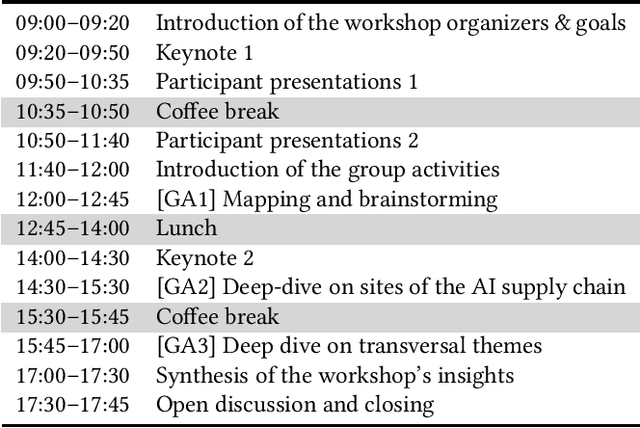
Abstract:This workshop will grow and consolidate a community of interdisciplinary CSCW researchers focusing on the topic of contestable AI. As an outcome of the workshop, we will synthesize the most pressing opportunities and challenges for contestability along AI value chains in the form of a research roadmap. This roadmap will help shape and inspire imminent work in this field. Considering the length and depth of AI value chains, it will especially spur discussions around the contestability of AI systems along various sites of such chains. The workshop will serve as a platform for dialogue and demonstrations of concrete, successful, and unsuccessful examples of AI systems that (could or should) have been contested, to identify requirements, obstacles, and opportunities for designing and deploying contestable AI in various contexts. This will be held primarily as an in-person workshop, with some hybrid accommodation. The day will consist of individual presentations and group activities to stimulate ideation and inspire broad reflections on the field of contestable AI. Our aim is to facilitate interdisciplinary dialogue by bringing together researchers, practitioners, and stakeholders to foster the design and deployment of contestable AI.
An Empirical Exploration of Trust Dynamics in LLM Supply Chains
May 25, 2024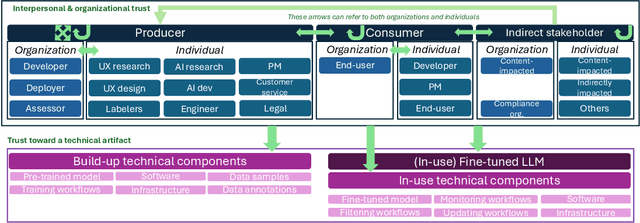
Abstract:With the widespread proliferation of AI systems, trust in AI is an important and timely topic to navigate. Researchers so far have largely employed a myopic view of this relationship. In particular, a limited number of relevant trustors (e.g., end-users) and trustees (i.e., AI systems) have been considered, and empirical explorations have remained in laboratory settings, potentially overlooking factors that impact human-AI relationships in the real world. In this paper, we argue for broadening the scope of studies addressing `trust in AI' by accounting for the complex and dynamic supply chains that AI systems result from. AI supply chains entail various technical artifacts that diverse individuals, organizations, and stakeholders interact with, in a variety of ways. We present insights from an in-situ, empirical study of LLM supply chains. Our work reveals additional types of trustors and trustees and new factors impacting their trust relationships. These relationships were found to be central to the development and adoption of LLMs, but they can also be the terrain for uncalibrated trust and reliance on untrustworthy LLMs. Based on these findings, we discuss the implications for research on `trust in AI'. We highlight new research opportunities and challenges concerning the appropriate study of inter-actor relationships across the supply chain and the development of calibrated trust and meaningful reliance behaviors. We also question the meaning of building trust in the LLM supply chain.
A.I. Robustness: a Human-Centered Perspective on Technological Challenges and Opportunities
Oct 19, 2022
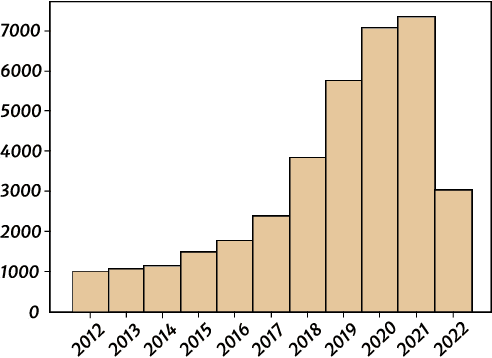
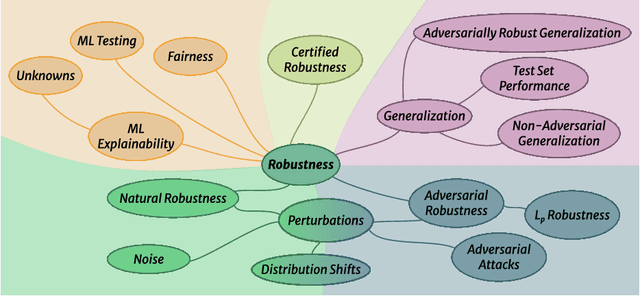
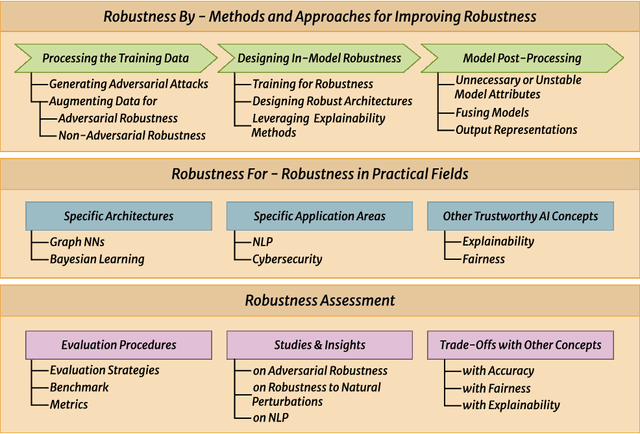
Abstract:Despite the impressive performance of Artificial Intelligence (AI) systems, their robustness remains elusive and constitutes a key issue that impedes large-scale adoption. Robustness has been studied in many domains of AI, yet with different interpretations across domains and contexts. In this work, we systematically survey the recent progress to provide a reconciled terminology of concepts around AI robustness. We introduce three taxonomies to organize and describe the literature both from a fundamental and applied point of view: 1) robustness by methods and approaches in different phases of the machine learning pipeline; 2) robustness for specific model architectures, tasks, and systems; and in addition, 3) robustness assessment methodologies and insights, particularly the trade-offs with other trustworthiness properties. Finally, we identify and discuss research gaps and opportunities and give an outlook on the field. We highlight the central role of humans in evaluating and enhancing AI robustness, considering the necessary knowledge humans can provide, and discuss the need for better understanding practices and developing supportive tools in the future.
Towards a multi-stakeholder value-based assessment framework for algorithmic systems
May 09, 2022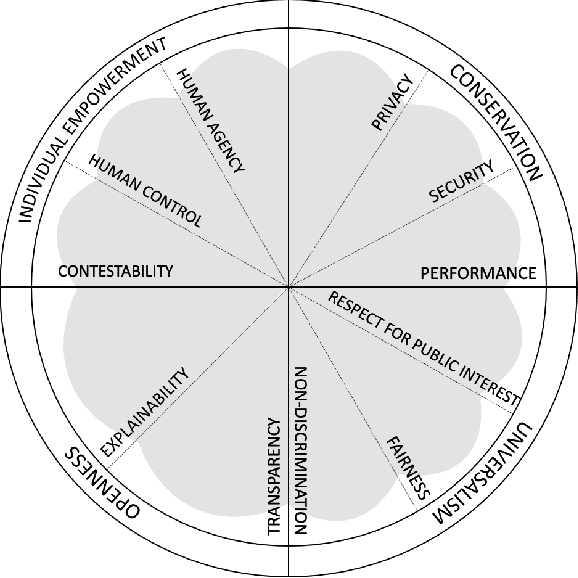


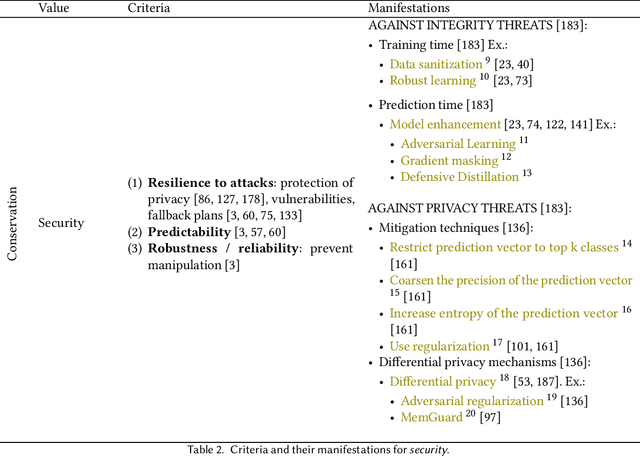
Abstract:In an effort to regulate Machine Learning-driven (ML) systems, current auditing processes mostly focus on detecting harmful algorithmic biases. While these strategies have proven to be impactful, some values outlined in documents dealing with ethics in ML-driven systems are still underrepresented in auditing processes. Such unaddressed values mainly deal with contextual factors that cannot be easily quantified. In this paper, we develop a value-based assessment framework that is not limited to bias auditing and that covers prominent ethical principles for algorithmic systems. Our framework presents a circular arrangement of values with two bipolar dimensions that make common motivations and potential tensions explicit. In order to operationalize these high-level principles, values are then broken down into specific criteria and their manifestations. However, some of these value-specific criteria are mutually exclusive and require negotiation. As opposed to some other auditing frameworks that merely rely on ML researchers' and practitioners' input, we argue that it is necessary to include stakeholders that present diverse standpoints to systematically negotiate and consolidate value and criteria tensions. To that end, we map stakeholders with different insight needs, and assign tailored means for communicating value manifestations to them. We, therefore, contribute to current ML auditing practices with an assessment framework that visualizes closeness and tensions between values and we give guidelines on how to operationalize them, while opening up the evaluation and deliberation process to a wide range of stakeholders.
 Add to Chrome
Add to Chrome Add to Firefox
Add to Firefox Add to Edge
Add to Edge